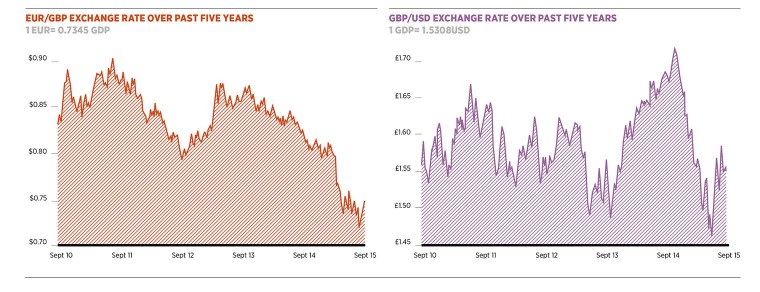As international governments begin to unwind post-credit crisis fiscal policies, interest rates are set to rise.
Widespread currency volatility has followed, meaning businesses have had to rethink hedging strategies and look more closely at how to protect their businesses.
For companies exposed to fluctuating foreign currencies, such as those with a particularly heavy reliance on imports or exports, keeping abreast of the likely market trends is essential.
Any company with a core business activity that relies on currency conversion, in the form of payments to foreign suppliers or repatriating international revenue, should be concerned about FX volatility
Richard de Meo, managing director of business foreign exchange (FX) specialists Foenix Partners, says: “Any company with a core business activity that relies on currency conversion, in the form of payments to foreign suppliers or repatriating international revenue, should be concerned about FX volatility.”
Mr de Meo says the movement of certain currency pairs during the past 12 months has given many of his customers particular cause for concern.
“GBP/USD has stabilised in recent weeks, but after a peak of 1.72 last July this pairing fell dramatically to 1.46 in April 2015, equivalent to 15 per cent in eight months,” he says.
“Similarly, GBP/EUR has risen from 1.24 in September last year to a new seven-year high above 1.44 on the back of the Greek debt breakdown, which is an increase of over 17 per cent in ten months.”
With businesses having already seen considerable volatility since the start of the year, it is perhaps no surprise that further measures are being taken to insulate corporates against the ill winds still to come.

Dollar strength, euro weakness
At the time of writing, the USD index was trading at 12-year highs with the market preparing for an interest rate hike in September.
Tobias Davis, corporate hedging manager at Western Union Business Solutions, says: “This is leaving emerging market currencies and the euro/dollar most vulnerable as rising rates will lead to a halt in cheap US-dollar funding.
“Hedging strategies utilising forwards and options allow businesses actively to mitigate this volatility, while protecting their margins.”
Closer to home, the pound’s rise against the euro has been getting plenty of coverage. While this may be good news for holidaymakers looking for an extra ice cream, it’s doing little for some businesses.
David Lamb, head of dealing at Fexco, explains: “The Greek crisis had weighed down the euro and the increasing likelihood of a rise in UK interest rates is strengthening the pound.
“With such divergent fortunes on opposite sides of the Channel, the sterling/euro pair isn’t so much a tale of a two-speed Europe as one that’s heading in opposite directions.”
Mr Lamb notes that the contrast between the European Central Bank’s loose monetary policy and the increasingly hawkish stance being adopted by central bankers in the UK and the United States, where interest rates could rise before the end of the year, is also likely to cause continued tension and exchange rate volatility.
With such stark warnings from industry experts, businesses are seeking out ways to protect themselves.
FX protection
For those exposed because of the delay between contract agreement and payment, the easiest option is to offer a discount for the early payment of invoices.
Andy Scott, associate director of FX advisory services at foreign currency specialists, HiFX, says: “If you are concerned about your customers’ ability to pay, try and negotiate payment up front or set up payment in stages.”
Mr Scott says there are a variety of services available to ease the pressure on businesses.
He explains: “Products and services include sharing credit risks with the banks in order to assist exporters in the raising of tender and contract bonds, in accessing pre and post-shipment working capital finance and in securing confirmations of letters of credit.”
Another simple solution is shopping around. Given recent events, companies are becoming much smarter at finding better exchange rates by comparing their bank’s rate with that of a currency specialist.
Hedging risk
For those looking at more sophisticated ways of managing the risk, derivatives contracts offer another way to avoid being stung.
Fexco’s Mr Lamb explains: “Well-run businesses with a sound approach to risk management use forward contracts to protect their margins from currency volatility.
“These allow them to buy currency now with a small deposit – typically between 5 and 10 per cent – and lock into a specific exchange rate. They only pay the remainder when they actually need the money, but the fixed rate protects them against any sharp moves against them in the intervening period.”
But even though treasury and hedging policies build in some room for judgment based on market conditions, finance directors have been testing this flexibility to the limit in recent months.
Foenix Partners’ Mr de Meo adds: “Hedge ratios – the percentage of their currency exposure that they actually hedge – have been rising dramatically due to fear around volatility.”
Of course, smaller companies don’t always have the luxury of sophisticated hedging processes. Currency risk hedging techniques used by traditional banks can often be complex.
Some banks provide better rates to larger corporates, while smaller companies have previously had to pay more or negotiate complex pricing structures. The result is that smaller companies often choose not to hedge at all.

